Fair Housing Month Part 4: Fair Housing Rights and Responsibili…

April marks a significant period dedicated to raising awareness and fostering understanding of fair housing practices 🏠🌈. As we wrap up this Fair Housing Month series, it’s crucial to spotlight the rights and duties under the Fair Housing Act ✊. This piece aims to inform and empower tenants and landlords with knowledge, ensuring everyone plays their part in upholding dignity and equality in housing 🤝.
Understanding Your Rights as a Tenant
The Fair Housing Act was established to prevent discrimination in the rental, sale, and financing of dwellings based on race, color, national origin, religion, sex, familial status, or disability 🚫🤍. Knowing your rights is the first step towards protecting yourself and others from unfair practices.
1. Protection from Discrimination
Everyone is entitled to search for a home without facing prejudice. This means landlords cannot refuse to rent, sell, or negotiate with someone based on their race, religion, gender, or any other protected characteristic. Similarly, advertising that indicates a preference towards or against someone based on these characteristics is illegal 🚫👥.
2. Reasonable Accommodations and Modifications
If you have a disability, the law ensures your right to request reasonable accommodations or modifications to your living space 🛠️♿. Accommodations might include a landlord allowing a service animal in a no-pet building 🐕. Modifications could be physical changes to the property, like installing grab bars in a bathroom. While landlords are not required to bear the cost of these modifications, they must allow them, provided they are reasonable and the tenant covers the expenses.
3. Equal Access to Amenities and Services
As a tenant, your rights extend beyond the leasing process. The Fair Housing Act also ensures that you have equal access to all amenities and services associated with a dwelling 🏋️♀️🚗. This includes, but is not limited to, access to fitness centers, parking facilities, and common areas. Landlords cannot restrict access to these amenities based on race, gender, disability, or other protected characteristics.
4. Freedom from Harassment
The law protects tenants from harassment or intimidation based on their protected status 🚫🗣️. This protection covers actions by landlords, property management staff, and even other tenants. If you experience harassment that interferes with your right to enjoy your home peacefully, it violates your fair housing rights.
5. Privacy and Respect
Your right to privacy is also protected under fair housing laws 🚪🔒. Landlords must respect your space and provide reasonable notice before entering your rented property, except in emergencies. Any intrusion that seems excessive or without proper notice might violate your rights.
Understanding your rights is pivotal, but knowing how to act is equally important. Suppose you believe your rights have been violated. In that case, several avenues exist for reporting and resolving these issues, from filing a complaint with the Department of Housing and Urban Development (HUD) to seeking legal assistance ⚖️📞.
The Landlord’s Responsibilities: Beyond the Basics
Landlords carry a significant responsibility in the fair housing equation. Their role goes beyond simply refraining from discriminatory practices; it involves active participation in promoting fairness and equality ⚖️🏘️.
1. Ensuring Equality in Housing Opportunities
Landlords must ensure that all potential and current tenants are treated equally. This responsibility encompasses all phases of the leasing process, from advertising and showing properties to setting lease terms and conditions. Any form of discrimination, intentional or unintentional, can have serious legal consequences.
2. Providing Reasonable Accommodations
Understanding and respecting requests for reasonable accommodations is a legal obligation for landlords. This might include making exceptions to policies (e.g., allowing service animals in a no-pet property) for individuals with disabilities. Landlords need to engage in a dialogue with tenants to understand their needs and how best to meet them within the scope of the law 🗣️💬.
3. Handling Modifications with Care
When a tenant requests modifications to their dwelling to accommodate a disability, landlords must permit these changes, given they are reasonable. While the financial responsibility for these modifications typically falls on the tenant, landlords should work cooperatively to ensure the process is smooth and respectful of the tenant’s needs.
Reporting Violations: A Step-by-Step Guide
Document Everything: Keep detailed records of any incidents that you believe violate your fair housing rights, including dates, times, and names of individuals involved 📝.
Seek Internal Resolution: Sometimes, addressing the issue directly with your landlord or the property management can resolve the problem. It’s always a good first step to communicate your concerns 🗣️.
File a Complaint: If internal resolution fails, you can file a complaint with the U.S. Department of Housing and Urban Development (HUD) online, by mail, or by phone. HUD will investigate the complaint at no cost to you 🖥️✉️📞.
Consider Legal Counsel: In some cases, you may seek legal advice from an attorney specializing in fair housing laws. They can guide your situation and represent you if necessary ⚖️👩⚖️.
Conclusion: A Call to Action
Fair Housing Month is an opportunity to catalyze ongoing education and action because we all need Fair Housing or to affirmatively further Fair Housing for all. For tenants, knowing your rights is the foundation of empowering yourself against discrimination. For landlords, understanding your responsibilities is critical to fostering an inclusive and equitable housing market is the beginning. I recommend that regardless of your experience as a landlord or if you are a licensed real estate professional, you do not manage your properties. Laws are changing to protect the consumer, and the rules of engagement can be challenging to understand and execute. Even attorneys do not represent themselves as their client. Hire a reputable and experienced property management company.
In our journey towards fair housing, every action, no matter how small, contributes to a more significant movement towards equality. By educating ourselves and others, we can work towards a future where everyone can find a home without facing barriers. Let this month be a reminder of our progress and the work that still lies ahead. Together, we can continue to break down walls and build communities grounded in fairness and respect 🤝🌍.
Fair housing is more than just a legal requirement; it’s a moral imperative that enriches our communities and lives. Whether you’re a tenant, landlord, or simply someone passionate about justice, your role in this endeavor is crucial. Let’s carry the spirit of Fair Housing Month forward, ensuring every month is a step towards greater understanding, equality, and respect for all 🌟.
Embrace your future in Real Estate and champion the cause of Fair Housing today! Schedule a personalized consultation with Eric Lawrence Frazier, MBA, via phone or video. Together, let’s celebrate the strides made toward equitable housing and continue to pave the way for a more inclusive industry. Your power is now—seize it and contribute to a legacy of fairness and opportunity in real estate ✨🏡.
Eric Lawrence Frazier MBA
President | CEO | Advisor
Real Estate | Mortgage | Business | Media | Marketing
The Power Is Now Media Inc.
800-401-8994 ext. 703
Direct: 714-475-8629
CA DRE: 01143484 NMLS: 461807
Appointment Calendars:
Homebuyer consultation: https://calendly.com/ericfrazier/homebuyerconsultation
Homeseller consultation: https://calendly.com/ericfrazier/realestateconsultation
Real Estate Agent Consultation: https://calendly.com/ericfrazier/agentorientation
About The Power Is Now Media: https://www.thepowerisnow.com/about
Like this project
Posted Dec 7, 2024
I crafted SEO-optimized, engaging content, researched market trends, and created compelling narratives that boosted conversions, enhanced brand visibility.
Likes
0
Views
4
Clients

The Power Is Now Media





